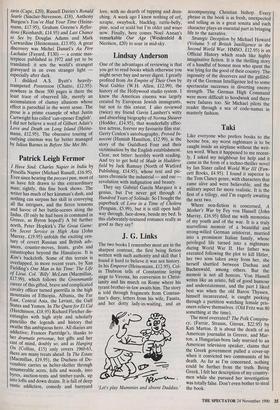J. G. Links
The two books I remember most are in the sharpest contrast, the first being fiction written with such authority and skill that I found it hard to believe it was not history. In his Emperor (Heinemann, £12.95), Col- in Thubron tells of Constantine laying siege to Verona, his conversion to Christ- ianity and his march on Rome where his tyrant brother-in-law awaits him. The story is told through fragments from Constan- tine's diary, letters from his wife, Fausta, and her dotty lady-in-waiting, and an 'Let's play Mummies and absent Daddies.' accompanying Christian bishop. Every phrase in the book is as fresh, unexpected and telling as in a great sonata and each character plays an essential part in bringing life to the narrative.
Strategic Deception by Michael Howard (Volume 5 of British Intelligence in the Second World War, HMSO, £12.95) is an Official History which reads like highly imaginative fiction. It is the thrilling story of a handful of honest men who spent the war lying for the good of their country. The ingenuity of the deceivers and the gullibil- ity of the German Intelligence led to some spectacular successes in diverting enemy strength. The German High Command were more difficult to hoodwink and there were failures too. Sir Michael pilots the reader through a sea of code-names in masterly fashion.


































































 Previous page
Previous page